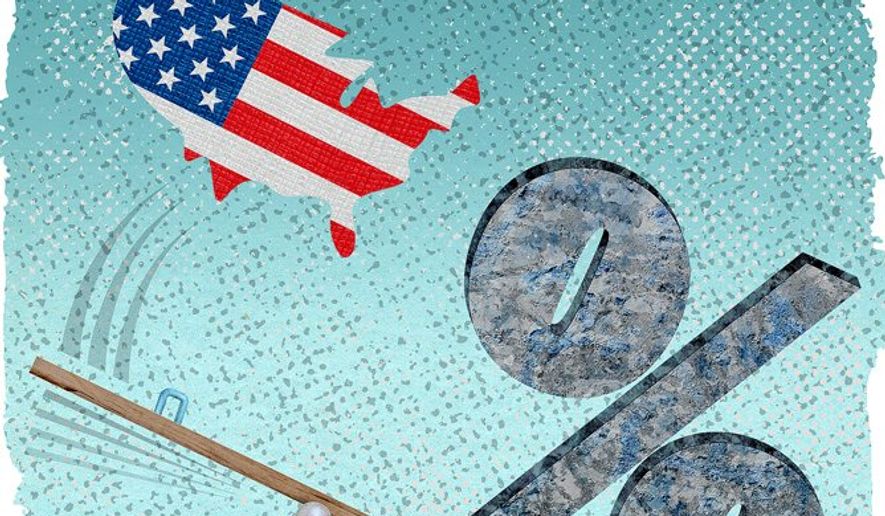OPINION:
President Biden is under intense pressure from progressives to raise taxes on more prosperous Americans and corporations. With a tightly divided Congress, that’s a tough proposition, and he might be better off to rally public support for replacing the personal and corporate income taxes with a value-added tax to finance his policy agenda.
The Trump tax reform didn’t reform much; the old system of excessively high rates and voluminous deductions and credits largely continues. Although nearly 90$ of individual filers take new, larger standard deductions, we now have two parallel systems.
Most folks who itemized before have to keep the same records and enter the same information into tax software to determine whether they are better off itemizing or taking the $12,400 standard deduction for individuals or $24,800 for married couples.
Providing so much detail about our activities and expenses to the federal government and tax professionals is an unconscionable intrusion on privacy.
As we learned during the Obama years, the left-leaning bureaucracy is not above harassing contributors to conservative causes and organizations. The IRS penchant for abuse was cultural, and don’t be surprised if zealots — yet unknown to Treasury Secretary Janet Yellen — surface again during the Biden presidency.
The whole system favors wealthy individuals and businesses, who can afford expensive accountants, lawyers and K Street lobbyists to work the tax code’s insane details and obtain special treatment during the complex processes of perpetually rewriting the tax laws and translating them into IRS rules.
Businesses are making decisions for reasons of tax avoidance, not sound economics. Democrats in Congress and left-leaning think tanks assert U.S. businesses still enjoy tax incentives to move activities offshore despite efforts to curtail those in 2017 Republican-led revision of the corporate tax law.
The most effective reform would be to simply junk the personal and corporate income taxes in favor of a value-added tax (VAT).
The Treasury annually collects about $1.9 trillion through income taxes. That money could be replaced by a national sales tax on all private purchases and payments — be they machine tools to stamp out microprocessors, restaurant meals or dry cleaning.
Businesses and institutions would then pay a fixed tax rate on receipts less taxes paid on expenses for materials, software and equipment, rent and so forth. This subtraction would avoid the double taxation of intermediate goods and services used to make other products as they move through the supply chain to final users.
By taxing goods and services instead of individual income, a VAT would end forever the requirement that ordinary citizens — even those with investment income or retirement annuities — file income tax returns.
For businesses, it would eliminate all the headaches and scheming associated with valuing inventories, depreciating buildings and machines and qualifying for special breaks, and save billions in accounting costs and legal fees.
By taxing goods and services at the point of sale, it would end the problem of U.S. firms parking assembly lines offshore to avoid taxes.
Overall, businesses and institutions would file much simpler tax returns.
To replace the revenue that individual and corporate taxes currently generate, the VAT rate could be set at about 10% but two problems remain. A VAT would tax rich and poor consumers at about the same rate. The elderly, who generally rely on savings, already paid taxes on the income that generated those savings during their working years and would be taxed again.
An effective response would be to raise the rate to 13%, and award $4,000 to parents for each child under 19 and to seniors 65 and older.
A working single mother with two children, who earned just $7.25 an hour, would have a family income above the poverty line. And under WTO rules, the VAT would apply to imports, providing additional resources to lessen inequality.
Going a step further, the Social Security and Medicare taxes could be eliminated by raising the rate to 19%.
Such a sales tax might seem high. However, businesses and individuals would no longer be paying a 15.3% payroll tax on most wages plus income taxes. And businesses would no longer be passing through corporate taxes on the prices they charge.
Mr. Biden proposes about $430 billion in new revenue to pay for his policy agenda — that would raise the rate to 22%. He would have the opportunity to explain why his priorities are worth such a visible increase in taxes.
Elegant, efficient and terribly transparent, a VAT would show voters just how much big government costs and address inequality.
• Peter Morici, @pmorici1, is an economist and emeritus business professor at the University of Maryland, and a national columnist.




Please read our comment policy before commenting.